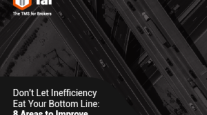Trucking Meets Tech With Startup Cargo42's Strategy

Francine Gervazio worked in the logistics industry in her home country of Brazil and Australia, and she saw first hand how inefficient the industry could be. In fact, she says, one out of every five trucks on the streets is traveling empty. While at Babson College in Massachusetts studying entrepreneurship, she came up with concept behind Cargo42.
Cargo42 is a B2B marketplace for local trucking. It helps shippers find lower rates, access quality service and have their goods delivered on time by matching them with pre-verified trucks with empty space in them. At the same time, trucking companies enjoy an additional revenue stream and maximize the trucks’ productivity.
“Our goal is to bring technology to local trucking in South Florida, making trucks more effective and offering affordable rates to shippers by connecting them through a very simple app,” said Gervazio, who co-founded the company with Babson classmates Murilo Amaral and Alfredo Keri.
Cargo42 was a triple winner in the Miami Herald Business Plan Challenge. It won the judges’ vote in the Community Track for its solid idea leveraging the sharing economy in a traditional industry and a strategic plan for execution; Cargo42 was also crowned the People’s Pick for attracting the most online votes. Because of its results in both the judges’ vote and the People’s Pick, it was also named the Challenge Champion, the overall contest winner.
The best part is that our community enjoys traffic and pollution reduction by making use of trucks already on the road.
The team says its concept has a triple benefit. If trucks were to travel at capacity, they could potentially generate additional revenue of more than $60 billion. At the same time, shippers would be more efficient with their orders, conserving time, money and manpower. Finally, and perhaps the most important, is the environmental impact: “By maximizing the use of trucks already on the street we could eliminate thousands of underutilized trucks. It creates a positive impact on pollution and traffic,” the team wrote in its plan.
The team brings logistics industry, sales and startup experience to the new venture. Gervazio managed operations for a taxi startup that operated in Asia and Latin America. Amaral started a fast-growing printing company in Brazil that was acquired; then the larger acquiring company hired him as chief operating officer. Keri has experience in sales, brands and trade marketing in the consumer goods area.
Once the classmates developed and tested the concept, they looked for the best place to build their company. Miami, a hub for trade and logistics, ticked all the boxes.
After graduating, the trio rolled into Miami last year with a big dream and a strategic plan. They quickly made it a point to meet the players in the trucking and logistics industry as well as the tech community.
They went to local tech meetups and Chamber of Commerce events as well as industry meetings, trade shows and conferences. They presented their company at a meeting of the Miami-Dade Beacon Council, the county’s economic development agency. They took advantage of local resources, such as Mentor Day, an organization that pairs entrepreneurs with mentors, and mentoring organization Enterprise Development Corp.’s “Meet the Investor” days. They met industry leaders such as Nabil Malouli, a vice president at DHL, who has become an adviser. They exhibited and competed at SUP-X, or The Startup Expo, a homegrown conference held in Fort Lauderdale annually. They applied and were accepted into the second cohort of StartUP FIU’s Empower accelerator, part of the university’s community initiative to help startups.
For the past year, the team has developed an app with a simple user interface. So far, more than 130 shippers and 450 carriers have used the Cargo42 platform, Keri said. For every transaction, Cargo42 retains a percentage.
Gustavo Michael, operations manager of Kannoa, an outdoor furniture manufacturer, has used Cargo42 for 10 to 15 deliveries within the Miami metropolitan area this year, mainly for deliveries to warehouses or pickups from vendors. He learned about the startup through word of mouth. “Service has been great and they always follow up on deliveries. We will continue to be a client,” he said.
Cargo42, now with a team of eight, is in high sales mode to find more clients. But how does a startup afford a sales team? That’s where community resources come in.
Startup FIU has a Sales Lab staffed with trained interns available to member companies — Cargo42 has been a big user. “We’ve been getting some nice traction with their help,” Gervazio said. The startup is also working on improving its search engine optimization to attract more customers online.
Francine is going to make big things happen in the logistics world — you can bet on it. Alfredo and Murilo are no slackers either. It is a really sound management team.
RFC Logistics, a longtime Miami-based boutique freight forwarder, was one of Cargo42’s first customers and still is, said Jennifer Robertson-Ahrens, RFC’s president and certified U.S. exports compliance officer. “This industry is so old and when you meet young intelligent people like the Cargo42 team you can’t help but be inspired. Francine is going to make big things happen in the logistics world — you can bet on it. Alfredo and Murilo are no slackers either. It is a really sound management team. To meet them is to be impressed.”
More change is likely coming to the traditional trucking industry, with self-driving technology now in development. Cargo42 does not see this as a threat to its business because it’s already technology based. “We are helping the industry get integrated with technology,” Gervazio said. “By the time the technology comes, our customers will be used to technology. It’s all part of the tech transformation.”
Gervazio hopes a year from now, Cargo42 will be well known among truckers, and most shippers will be using its app in South Florida. After that, there’s a big world out there.
“The best part is that our community enjoys traffic and pollution reduction by making use of trucks already on the road,” Keri said in the team’s Challenge elevator pitch.
Distributed by Tribune Content Agency, LLC




